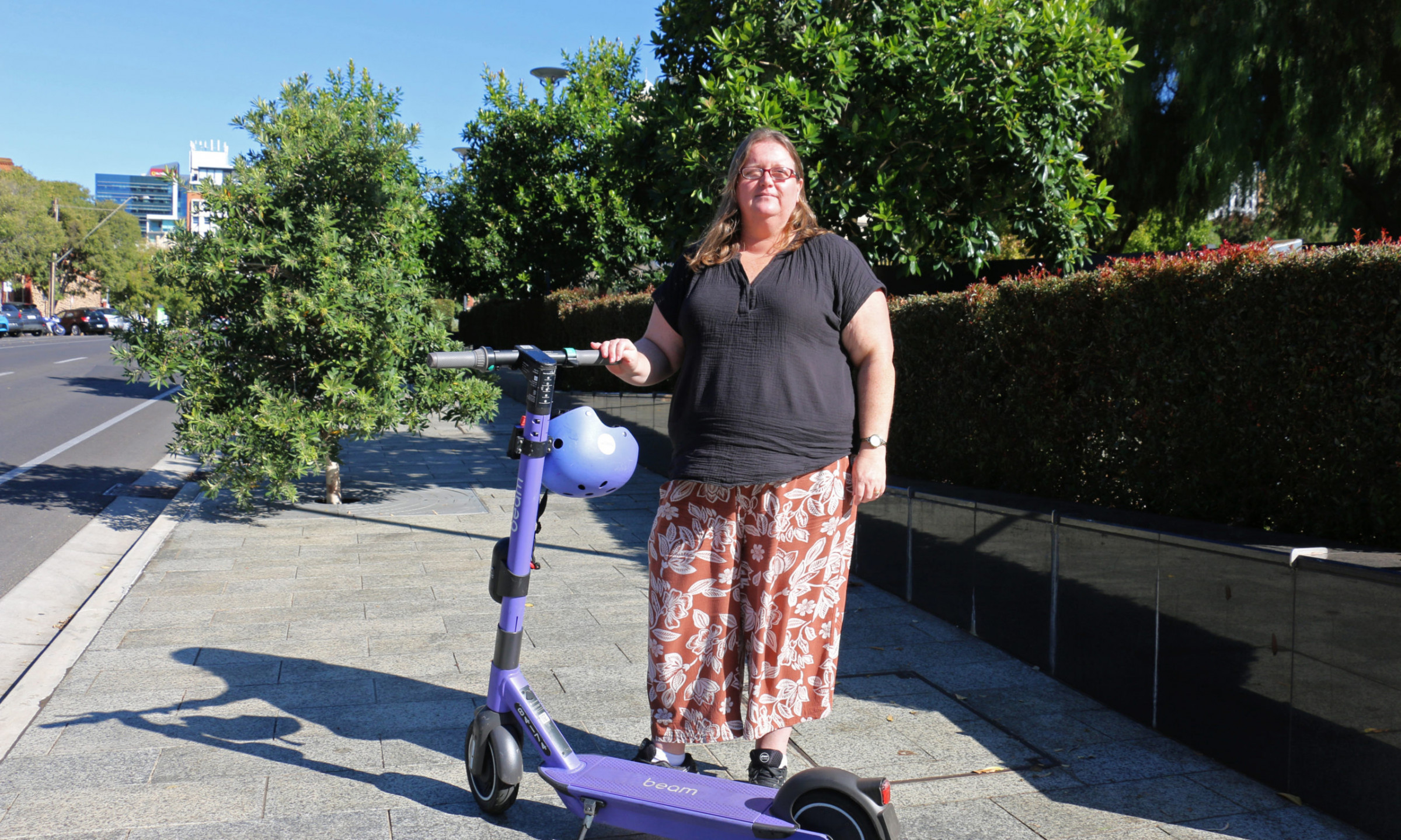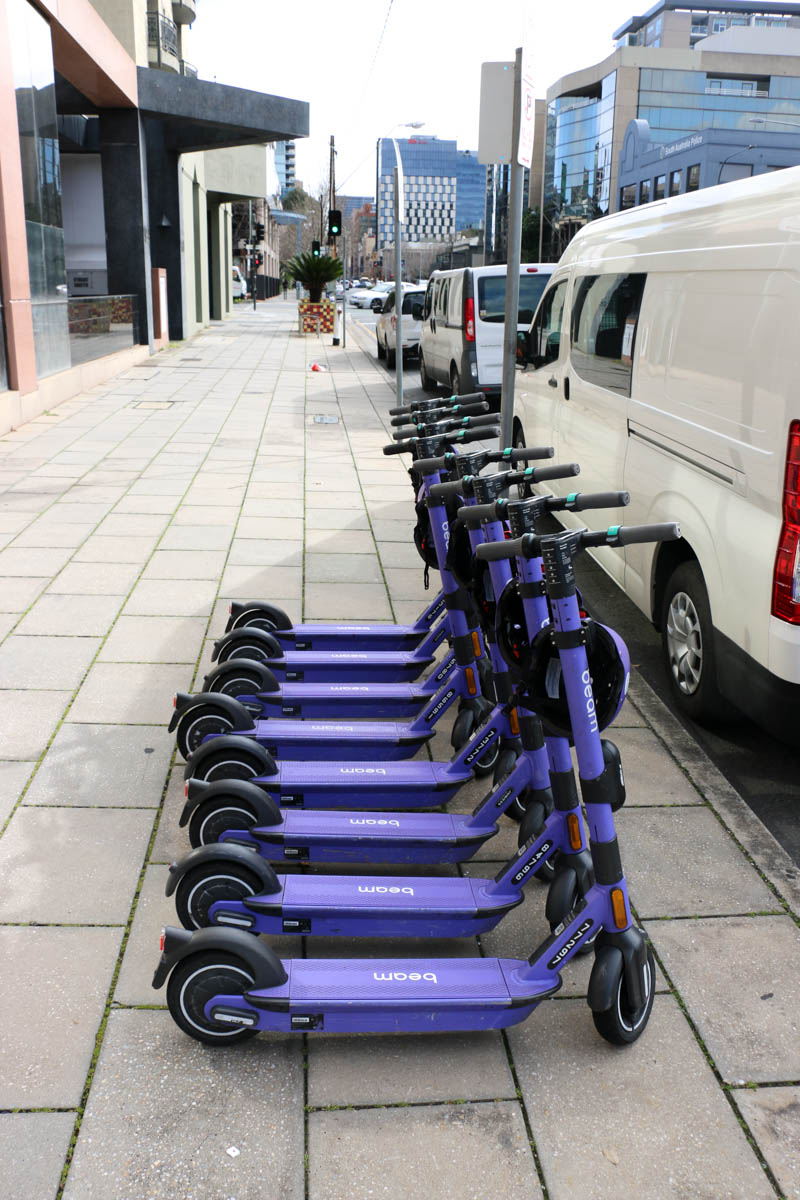As the Adelaide City Council and Parliament explore e-scooter and micro-mobility policy platforms, a Beam victim reveals she’s become the keeper of a trove of troubling testimonials.
E-scooter rules to be revved-up
Three years into the City of Adelaide’s micro-mobility e-scooter trial, the council has signalled it will develop a “policy position” on e-scooters to “enhance our advocacy on emerging modes of transport”.
In its 2022-23 Business Plan and Budget, the council said it will “work with the State and Federal Government to future proof infrastructure for emerging modes of transport, and trial smart, sustainable forms of public transport”.
SA-BEST MLC Frank Pangallo tells CityMag he’s frustrated by the current lack of rules governing the vehicles.
“They certainly need to be controlled, because at the rate it’s going now, they still pose problems for users and also for others on footpaths – pedestrians, people with disabilities,” he says.
“I do not understand why the State Government, or even the Adelaide City Council and other councils, have not taken the safety aspect into consideration by allowing these vehicles to hit footpaths.”
The Adelaide City Council’s e-scooter trial began in 2019 and currently has two active participants: Beam and Neuron. (Lime was previously approved but subsequently squeezed out.)
The trial area extends from the CBD and North Adelaide, but excludes Rundle Mall at all times and Hindley Street on Friday and Saturday nights.
There are rules restricting the use of e-scooters on South Australian roads:
— while Beam and Neuron e-scooters can be used in council-approved jurisdictions, privately owned “motorised scooters” are “not to be used” on roads;
— e-scooter users must be 18 and over, warn others to avert danger, and have “proper control” at all times;
— a rider can use footpaths and shared paths but must not exceed 15km/h;
— and approved e-scooters can be used on roads for a distance of 50m and when avoiding an obstruction or crossing, and must not use bike or bus lanes.
Still, e-scooters and their users are causing harm to other city users.
Three months ago, city worker Diana Reed spoke with CityMag about being hit by two female riders sharing a Beam e-scooter in February this year.
She was walking to a bus stop on Pulteney Street after finishing work at the University of Adelaide’s North Terrace campus when the purple scooter rammed into her side, injuring her foot.
—Diana Reed

Diana Reed
We caught up with Diana again and she reveals she’ll likely be managing chronic pain in her foot for “a long time”. “It will be chronic and it will stay around,” she says.
Since speaking out about her injury, Diana has also been inundated with reports of other people’s e-scooter collisions and near-misses.
“I’ve had in excess of 100 people tell me about misses and accidents,” she says. “Things are happening and not getting reported.”
Despite this, Diana is supportive of a firmed-up council policy position, saying governing bodies cannot continue “putting their head in the sand” when it comes to e-scooters and the safety issues they pose.
“It’s an endless trial,” she says.
The current trial period is due to end on 31 October 2022.
Lord Mayor Sandy Verschoor says the council has “identified a need” to develop the micro-mobility policy, as per the current budget, telling CityMag the framework would fulfil community safety and legal purposes.
“The policy position will focus on e-scooters, bike share, and other small, lightweight vehicles operating at speeds typically below 25 km/h,” she says in a statement.
New here? Sign up to receive the latest happenings from around our city, sent every Thursday morning.
“The policy will consider all current and proposed future state legislation surrounding these micro mobility devices.”
The uptake of e-scooters in the city is “incredibly popular”, she says, with 2500 e-scooter trips taken daily.
Road Safety Minister Joe Szakacs tells CityMag the South Australian Government has committed to consulting with “privately owned” electric mobility device users and the broader community to “explore the potential to expand the current trial framework”.
“We are considering all options and will work with the stakeholders and community to ensure the best outcome is achieved for community safety,” he says.
—Robert Simms

A convoy of Beams
Joe’s support comes as Parliament developed a Select Committee on Public and Active Transport in June, tasked with inquiring into the state’s public and active transport affairs.
Greens MLC Robert Simms is the Chairperson of the Committee, and says it will explore e-scooters and the “potential opportunities for expansion or further regulation”.
A former Adelaide city councillor, Robert tells CityMag the Committee will look into whether e-scooters can be safely used on footpaths, and, if so, what this means for pedestrians.
“The committee’s terms of reference are pretty broad – we will be examining the need for further (or less) regulation of e-scooters and considering whether expansion is appropriate,” he tells CityMag.
“For instance, in South Australia, access to e-scooters differs depending on council borders and private, individual ownership is not permitted – requiring the user to hire scooters.
“Is there a case to open the door on private ownership and perhaps provide more training for individual e-scooter users to improve safety?”
The Committee’s next meeting is on 29 August and will hear from a consortium of industry professionals, including Beam and Neuron.
South Australian Police previously said they could not reveal how many e-scooter accidents were reported in the city over the last 12 months, and referred us to the Department for Infrastructure and Transport (DIT).
A DIT spokesperson said the purpose of e-scooter trials were to “test and evaluate” the integration of devices with infrastructure, pedestrians and other road and path users.
“As part of the trial conditions, the relevant council is responsible for working with providers to ensure safe use of e-scooters,” a statement from the department said.






